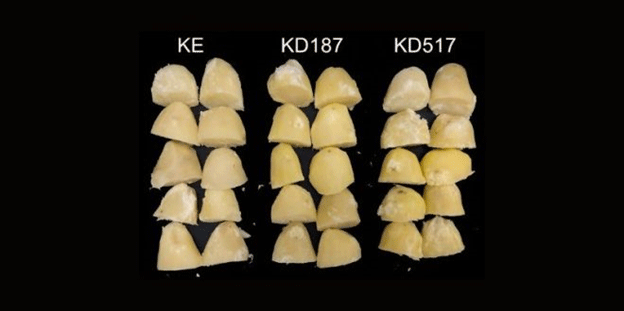As the global food supply faces mounting pressures from climate change, the need for resilient crops has never been greater. One crop that stands at the forefront of this challenge is the potato, the world’s third-most important food source. Vulnerable to a wide range of pests, diseases, and environmental stresses, potatoes have long required significant protection from external threats. However, a recent breakthrough from researchers at the Swedish University of Agricultural Sciences may herald a new era for crop resilience, with far-reaching implications for sustainable agriculture worldwide.
The research, which has been published in Horticulture Research and subjected to thorough peer review, focuses on the modification of the potato genome using CRISPR/Cas9 technology. By targeting and altering the StDMR6-1 gene, scientists have developed a new variety of potatoes with enhanced resistance to biotic stresses (like diseases) and abiotic stresses (such as drought and salinity). The results are nothing short of revolutionary, offering potatoes that not only survive but thrive in challenging conditions.
One of the most significant achievements of this work is the enhanced resistance to Phytophthora infestans, the pathogen responsible for late blight, which has historically decimated potato crops around the world. The modified potatoes exhibit a much stronger defense against this devastating disease without compromising yield or tuber quality—two critical factors for a successful harvest. Additionally, the potatoes show increased tolerance to abiotic stresses like drought and high salinity, providing a solution for regions facing water scarcity or poor soil quality.
The broader implications of this research are profound. By reducing the need for chemical treatments like fungicides, this genetically modified potato offers a more sustainable path forward for farmers. The ability to grow crops that are naturally resistant to diseases and stressors could decrease the agricultural sector’s reliance on harmful chemicals, aligning with the global push toward more sustainable and eco-friendly farming practices.
“This research on StDMR6-1 mutants is poised to transform potato cultivation, offering a line of defense against the relentless challenges of climate change and the evolving threats of pathogens, securing our food supply for generations to come,” said Erik Andreasson, the corresponding author of the study.
While the study’s focus has been on potatoes, the potential for CRISPR/Cas9 technology to improve resilience in other crops is immense. The knowledge gained from this research could serve as a blueprint for modifying a wide range of plants, boosting their resistance to the growing number of challenges posed by climate change, pests, and diseases. This could lead to a more robust and secure global food system, capable of withstanding the pressures of a rapidly changing environment.
The CRISPR/Cas9-modified potato marks a significant step forward in the quest for resilient crops that can withstand both biotic and abiotic challenges. As climate change continues to intensify, this breakthrough provides hope for a more sustainable future in agriculture. By improving crop resilience and reducing dependence on harmful chemicals, this innovation may not only benefit potato cultivation but also offer solutions for a wide range of crops, ultimately supporting food security for future generations.







